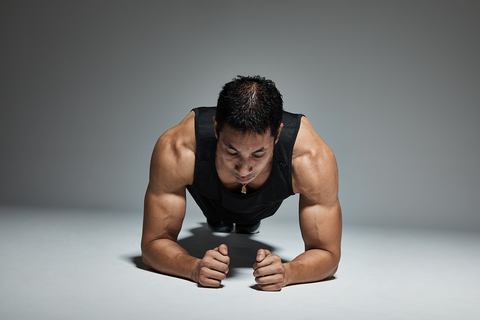Planks are a core workout staple—but are you sure you’re even doing the exercise correctly?
For this basic gym necessity, you shouldn’t settle for anything other than perfect form. Let Men’s Health Fitness Director Ebenezer Samuel, C.S.C.S., guide you through the exercise’s subtleties, saving you from the bad habits that are keeping you from unlocking your fitness potential. I’ll lend a hand too, as we demonstrate how to perform some extra-challenging variations.
Just remember to make sure you have enough room to stretch out on the ground—and if you want to protect your elbows, use a good mat.

Paolo Testa
This Is a Full-body Move
Eb says: The plank can be as easy or hard as you make it; it’s your job to make it hard to get the most out of it. That means creating full-body tension. You want your whole body rigid for the plank, so you should maintain some tension in your shoulder blades, drive your upper arms, from elbows to shoulders, perfectly perpendicular to the ground, maintain a ton of tension through your core (obviously) and squeeze your quads to straighten your knees. It’s better to hold a truly focused plank for 30 seconds to a minute than to hold a lousy plank for 4 consecutive minutes.
Squeeze Your Glutes!
Eb says: If there’s one thing people forget to involve in the plank, it’s their glutes. And that leads to the most common flaw you see in a plank: the butt being the highest point in the plank and the loss of a truly flat back. You avoid this by actively squeezing your glutes: That’ll drive your hips into a cleanly neutral position and help you maintain a truly straight line from shoulders down through legs.
Maintain Upper Back Tension
Eb says: You want to keep a flat back, parallel to the ground, when you plank. Think about letting somebody eat dinner on your back; that’s how flat it should be. To do that, you need a sturdy base from shoulders through upper arms. Actively drive your elbows into the ground and try to keep your upper arms perpendicular to the ground the entire time. Then lightly squeeze your shoulder blades together, too. They shouldn’t be fully squeezed (that’ll contribute to some core sagging), but you should maintain upper back tension.
Flex Your Abs!
Eb says: This is typically an ab exercise, after all, so attack it like one. Don’t just keep your core tight, but flex your abs, and work to feel them working. Think about using them to keep your ribcage closed; that’ll engage the entire core complex and make this a better workout.
Once your master the basic form, try these variations (as demonstrated above).
Source: Read Full Article
